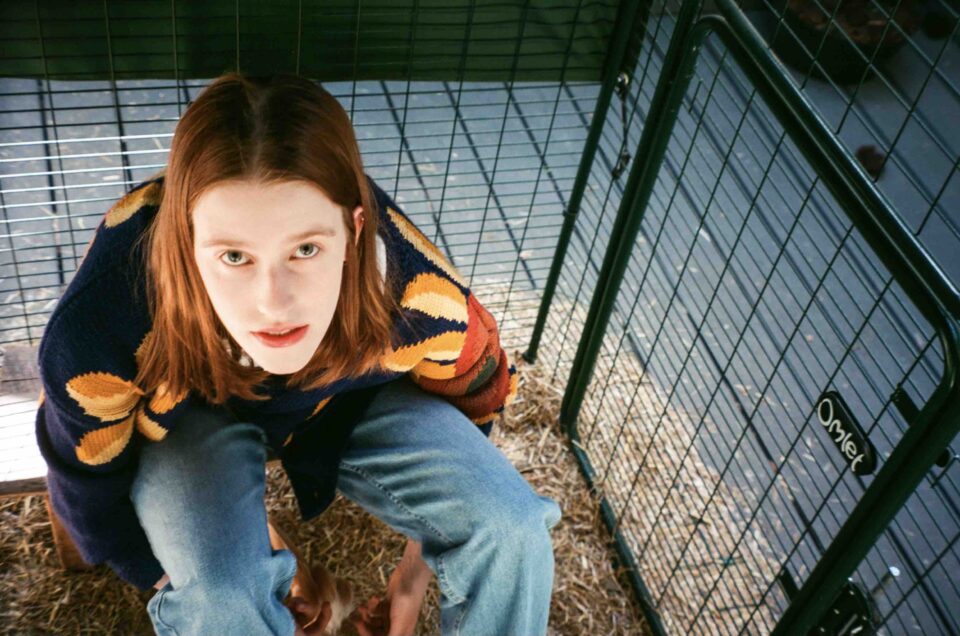This article appears in FLOOD 12: The Los Angeles Issue. You can purchase this special 232-page print edition celebrating the people, places, music and art of LA here.
BACKSTORY: 18-year-old songwriter who creates moving, piano-based tracks that resonate with every generation
FROM: Los Angeles, California
YOU MIGHT KNOW HER FROM: Her stunning debut album I Can Go to Bed Whenever released in 2021
NOW: Going to school and writing new material
Willa Amai already knows plenty about how to write a moving song, but she’s always absorbing knowledge. “I think my growth has greatly influenced my writing. It’s constantly changing, because I'm constantly learning new things,” the songwriter says on a weeknight evening, sandwiched between a day at school and a show she’s performing that night.
While Amai is young, she’s already a veteran songwriter. She’s been writing songs since the age of 12, working under the tutelage of Linda Perry, who has produced and penned songs with luminaries like Christina Aguilera, Adele, and Alicia Keys. “On the musician front, I was learning about production, about sound engineering, about mixing and comping and scoring, and all of that stuff that obviously pushed me so far,” Amai says of Perry’s teachings, while also mentioning how much Perry has taught her about honing her work ethic and discipline.
“I think my growth has greatly influenced my writing. It’s constantly changing, because I’m constantly learning new things.”
Amai’s debut album I Can Go to Bed Whenever, released in June 2021, is a perfect introduction to her work, with piercing piano melodies bolstered by billowing production and lyrics which find Amai moving from vulnerable and searching to resilient and back again. In writing this music, Amai operates largely on gut feelings before cleaning things up. While she says she’s not especially spiritual, she explains that when she writes she feels like a conduit for the music. “I think that's such a magical thing, to be the translator between a pre-song—something that's so abstract, just floating in the air, and you can really grab onto it,” she says. “There's something that's real and almost tactile. I think that's amazing.” Most of her songs have been written largely in one sitting, but she notes she’s getting more comfortable leaving songs unfinished and coming back to them later.

From conception to the final product, Amai’s music revolves around the piano, and it’s clear this instrument in particular is special to her, as she calls it “comforting” several times over the course of our conversation. “As long as the volume is up high enough in the mix, the piano will always feel at the forefront of your mind. It's such a grand instrument,” she says.
All of I Can Go to Bed Whenever was recorded live, and Amai explains that the other musicians taking cues from the piano aided in making the final mixes breathe and feel as alive as she’d envisioned. She firmly believes the piano is one of the most accessible instruments from a standpoint of ease to play, with almost anyone able to tap out a few notes just by walking up to it, but it also shines in the right hands. “You're starting from something so simple, 88 keys that everybody can register and understand. And yet, some really deep and complex music can come from it. And I love that idea,” she explains.
“You’re starting from something so simple, 88 keys that everybody can register and understand. And yet, some really deep and complex music can come from it. And I love that idea.”
Lyrically, I Can Go to Bed Whenever is incredibly transparent when it comes to what’s going on in Amai’s head. Moments of emotional highs mix with frank depictions of anxiety and insecurity. The single “Blows By” finds her longing for the ability to cherish the quieter moments of life without worrying about what comes next. Amai serves as an ambassador for the National Alliance on Mental Illness, and she’s open about how much of her music is an outlet for working through anything she’s dealing with. “I've always wanted to express how I feel, especially in moments where I'm not proud of how I feel, because I want to provide an example for people my age, people younger than me, older than me,” she says. In her experience, simply talking about her feelings has never fully conveyed what she wants to say, and it’s through her music that the full picture of her mind comes through.
Nearly two years removed from I Can Go to Bed Whenever, Amai can see her own growth as well. She’s still maturing as a person, expanding as an artist, and simply learning as a student (a lesson on Emily Dickinson in her literature class inspired her to write a song about the poet), and each of those aspects of her expanding world interests her. The passage of time since the album’s release has also allowed Amai to be more objective (but not totally objective, she adds with a laugh) about what she wrote, and to be proud of not only simply finishing the project, but feeling pride for and taking full ownership of it as well. With an entire lifetime of experience ahead of her, Willa Amai knows there’s always more to learn and more to write. FL









